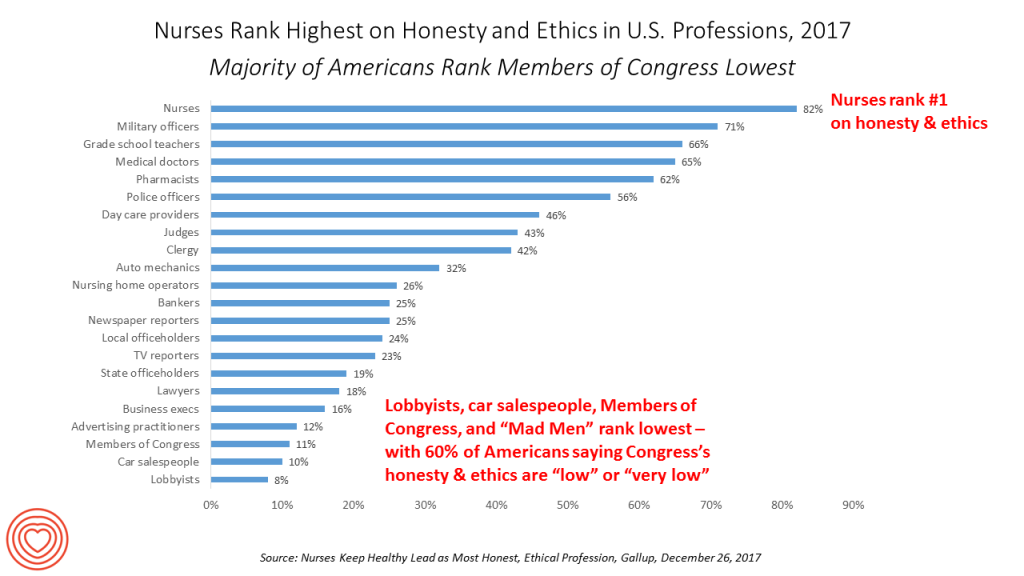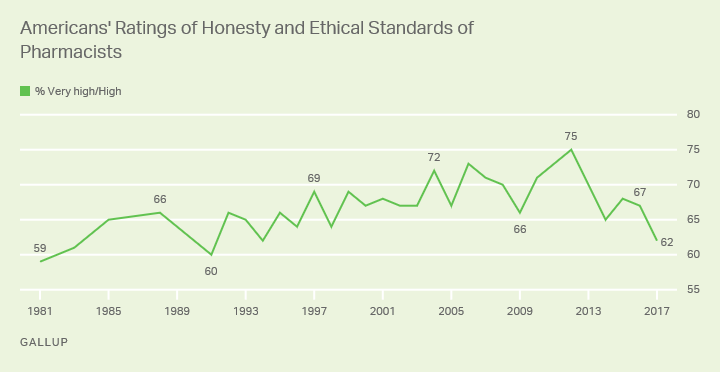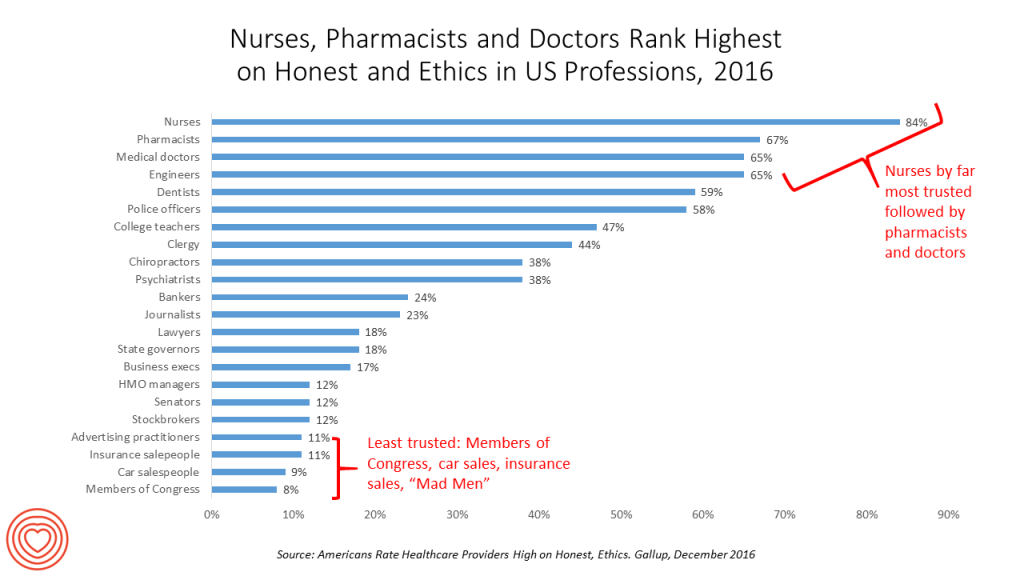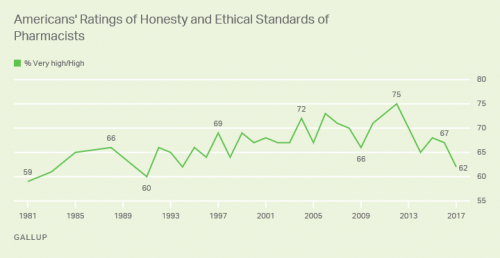 Nurses working in the U.S. are number one when it comes to ethics and honesty, the Gallup Poll found for the sixteenth year in a row. After nurses, military officers, grade school teachers, medical doctors and pharmacists rank second through fifth in ethical-line behind top-rated nursing.
Nurses working in the U.S. are number one when it comes to ethics and honesty, the Gallup Poll found for the sixteenth year in a row. After nurses, military officers, grade school teachers, medical doctors and pharmacists rank second through fifth in ethical-line behind top-rated nursing.
It’s important to note that consumers have ranked pharmacists and doctors in second and third place in this annual survey for many years. This year, both professions fall below the military and teachers. Nurses have been #1 in this study every year since Gallup launched the survey in 1999, except for 2001 when firefighters topped the list after 9/11.
At the bottom end of honesty and ethics we find lobbyists, auto sellers, and members of Congress ranking lowest in this year’s Gallup Poll, with Members of Congress as a profession garnering the greatest majority of Americans ranked “low” or “very low.” To that point, Gallup notes, “In a rare show of unity, roughly six in 10 Republicans, independents and Democrats alike rate the honesty of members of Congress lower than all other professions tested.”
The survey question is: “Please tell me how you would rate the honesty and ethical standards of people in these different fields — very high, high, average, low, or very low?” The Poll was fielded among 1,049 U.S. adults between 4th – 11th December 2017.
You can review some of my previous looks into this important study at the following links:
2016 – Nursing Seen As the Most Ethical Profession in America
2013 – Nurses Are the Most Trusted Professionals in America
2012 – Nurses, Pharmacists and Doctors Rank Top in Honest Says the Gallup Poll
2009 – Health Workers Are the Most Trusted Profession

Health Populi’s Hot Points: The precipitous honesty/ethics ratings drop in consumers’ trust in pharmacists is stunning in 2017: see Gallup’s line chart to realize that 3 in 4 health consumers ranked pharmacists with very high or high ethics and honesty just two years ago, falling 13 percentage points in just two years. Gallup calls out the opioid crisis as a key contributor to this decline.
I agree, and I would also add patients’ growing exposure to high prescription drug prices via both the pricing of medicines coupled with enrollment in high-deductible health plans where patients, now consumers, are financially responsible for paying first-dollar for specialty drugs and health care. Because consumers pay for medicines at the point-of-purchase in pharmacies, they may be under the impression that drugstores set prices for drugs. Many consumers do not understand the job PBMs play in developing formularies (approved drug lists) and price tiers for co-pays and coinsurance. Consider this a prescription drug pricing literacy gap. Companies like GoodRx, Blink Health and Oration are playing important roles bridging this gap.

The third chart is the one I created from last year’s Gallup Poll, illustrating that nurses, pharmacists, and doctors ranked first, second and third in line (tied with engineers).
What held from last year’s Poll is the lowest ranks of Congress people, car salespeople, and ad practitioners.
What has also held — for nearly all of sixteen years — is that nurses are the most trusted form of human capital in America. Imagine how health care can be made better if nurses were supported to the highest level of their license to deliver patient care? Imagine if nurses provided input into service and UX design for healthcare? What if more nurses were deployed in pharmacies and grocery stories to help people bolster health and wellness?
Wouldn’t it be nice if those Members of Congress could design health care legislation that boosted, through funding and licensing, nurses’ starring and valued role in health and health care in America? Might this effort even help the political profession rebuild some long-lost ethical capital?





 I love sharing perspectives on what's shaping the future of health care, and appreciate the opportunity to be collaborating once again with Duke Corporate Education and a global client on 6th May. We'll be addressing some key pillars to consider in scenario planning such as growing consumerism in health care, technology (from AI to telehealth), climate change, and trust -- the key enabler for health engagement or dis-engagement and mis-information. I'm grateful to be affiliated with the corporate education provider
I love sharing perspectives on what's shaping the future of health care, and appreciate the opportunity to be collaborating once again with Duke Corporate Education and a global client on 6th May. We'll be addressing some key pillars to consider in scenario planning such as growing consumerism in health care, technology (from AI to telehealth), climate change, and trust -- the key enabler for health engagement or dis-engagement and mis-information. I'm grateful to be affiliated with the corporate education provider  Thank you FeedSpot for
Thank you FeedSpot for